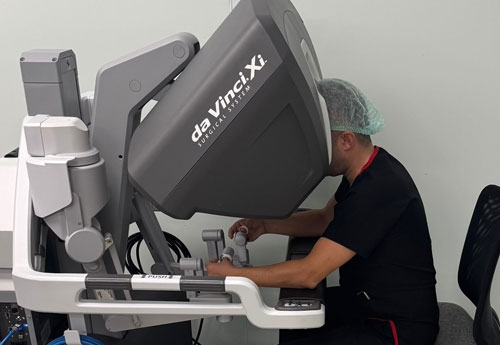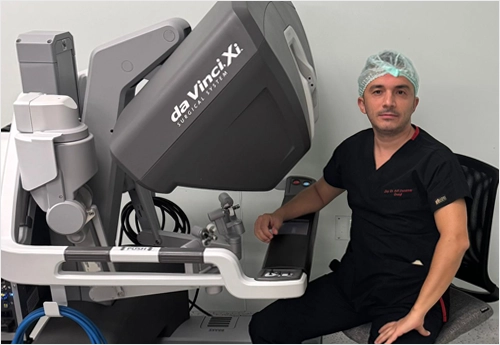Robotic prostate surgery is performed for prostate cancer. It is the complete removal of the cancerous prostate. It is called robotic radical prostatectomy in the medical literature. It is a minimally invasive technique compared to open surgery, thanks to the ports placed in the abdomen and the instruments that reflect the surgeon's hand movements.

We should consider the success of robotic prostatectomy in two stages. The first stage is oncological results and the second stage is functional results. Oncological results are similar to open surgery and vary according to the stage of cancer. In local stage prostate cancer, cancer-free survival can be achieved with robotic radical prostatectomy up to 99%. In some publications, it is emphasized that the success of robotic radical prostatectomy is higher for functional results such as urinary continence and preservation of erectile capacity. Again, this surgical technique is advantageous compared to the open technique in terms of bleeding and pain and provides rapid recovery.
There is no difference between the oncological and functional results of open and robotic prostatectomy, but robotic surgery has less bleeding, pain and hospital stay. These are the advantages of robotic surgery over open surgery.
This minimally invasive technique is not a very painful surgery and can usually be controlled with low- to moderate-dose painkillers. It is also a less painful surgery than open radical prostatectomy.

Robotic prostate cancer removal takes an average of 2-4 hours. This time may vary depending on factors such as whether lymph nodes are removed, the surgeon's experience, the stage of the tumor, and previous abdominal surgery the patient has had.
This procedure provides less pain and blood loss and faster recovery compared to open prostatectomy. It has a lower complication rate than laparoscopic radical prostatectomy. Again, some publications have reported that the robotic method is advantageous in terms of maintaining erection and urinary continence.
The average catheter duration is 7-10 days, which is shorter than open prostatectomy (average 2 weeks) because robotic surgery allows for a better anastomosis between the bladder and urethra.
For robotic prostate cancer surgery, general anesthesia, where the patient is asleep, should be applied.
Robotic prostatectomy is a minimally invasive technique that provides three-dimensional imaging and surgery, and creates a rapid recovery period. Daily tasks can be handled, and catheter-free life lasts an average of 10 days, while in open surgery this period is an average of 1 month.
After robotic prostate cancer surgery, some patients are expected to experience urinary incontinence. A significant portion of these patients recover over time. After the 12th month, the rate of urinary incontinence has been reported to be around 5-20% in various publications. In related publications, it has been stated that this rate is higher in open and laparoscopic radical prostatectomy.
Robotic prostatectomy is a more minimally invasive technique than open surgery, and its advantages are faster recovery, less bleeding and pain. The catheterization period is also shorter with robotic surgery. However, open surgery may be advantageous in some special cases. For example, open prostatectomy can be easily applied with spinal (regional) anesthesia in some patients who are at higher risk of general anesthesia due to lung and heart disease. Again, open surgery may be advantageous instead of robotic prostatectomy in patients with a history of multiple or complicated abdominal surgeries. Another disadvantage of robotic surgery is its cost.
Robotic prostate cancer surgery is classified as a major surgery and is safely performed in experienced clinics. Thanks to the robotic method, rapid recovery is achieved and minimal bleeding is achieved.
There are risks in robotic prostate surgery, as in traditional open surgery, and there is no zero-risk surgical method. The risk of bleeding, damage to other organs, and infection are also present in this surgical method. But bleeding and infection are less common than in open prostate surgery.
One of the most important problems after radical prostatectomy is impotence. Especially in the first months, serious deteriorations in erection are expected regardless of the technique. Various studies have shown that the recovery process can last up to 36 months and an average of 6-12 months should be waited.
During this rehabilitation process, PDE-5 inhibitor drugs such as sildenafil and tadalafil should be used. Various studies have stated that better potency preservation is provided in robotic prostate surgery compared to open radical prostatectomy (80% vs. 75% at the end of the first year) and this has been attributed to the imaging of the neurovascular bundle with the help of the robot. However, it is not correct to give a clear rate and it is contradictory. In addition, some publications have held many factors responsible for the possibility of deterioration in erection despite nerve-sparing surgery (additional diseases, effects of cancer on the mental health of both partners, smoking, age, previous erection status, body mass index, etc.).
Robotic prostate cancer removal prices vary from country to country, depending on hospital conditions, patient factors, whether lymph nodes will be removed, and the surgeon's experience. The average cost of robotic prostatectomy is around $10,000-13,000. For more information +905324850016 (WhatsApp).
For all your questions about robotic prostate cancer removal, you can reach our clinic via our WhatsApp line.
+905324850016
- I will definitely recommend this hospital in the future.
- I cannot recommend Dr. Arif Demirbaş enough.
- God continue to bless you in all your good work.
All TestimonialsMeet Alpha from Sierra Leone who just undergone a PCNL and Utereoscopy surgeries at the Doruk hospital in Bursa. I want to start by sending a massive thank you to Dr Arif for exhibiting such a {...}
24.01.2025I cannot recommend Dr. Arif Demirbaş enough. My father had been living with a catheter for over two years due to benign prostatic hyperplasia, which also caused bladder stones and an inguinal h{...}
24.01.2025Thanks to you Dr Arif for your successful kidney stone surgery on my Son Ryan since after we came back from Turkey to date Alhamdulillah Ryan is very ok Alhamdulillah bravo for your Good work. {...}
24.01.2025